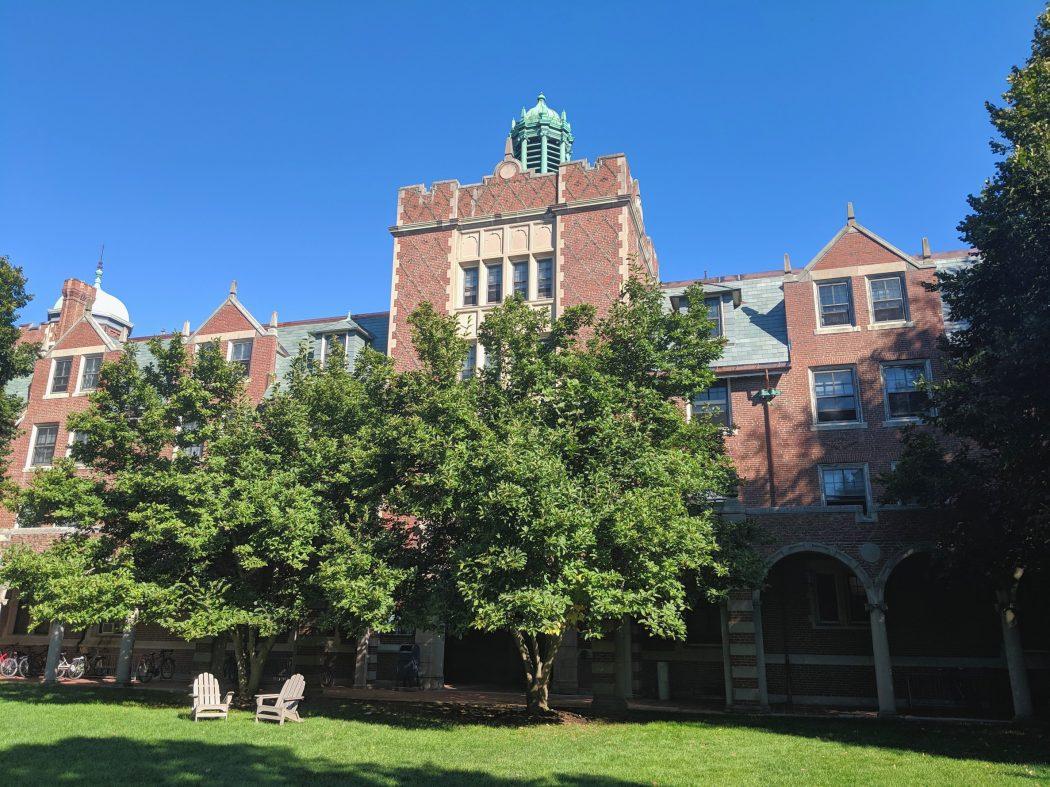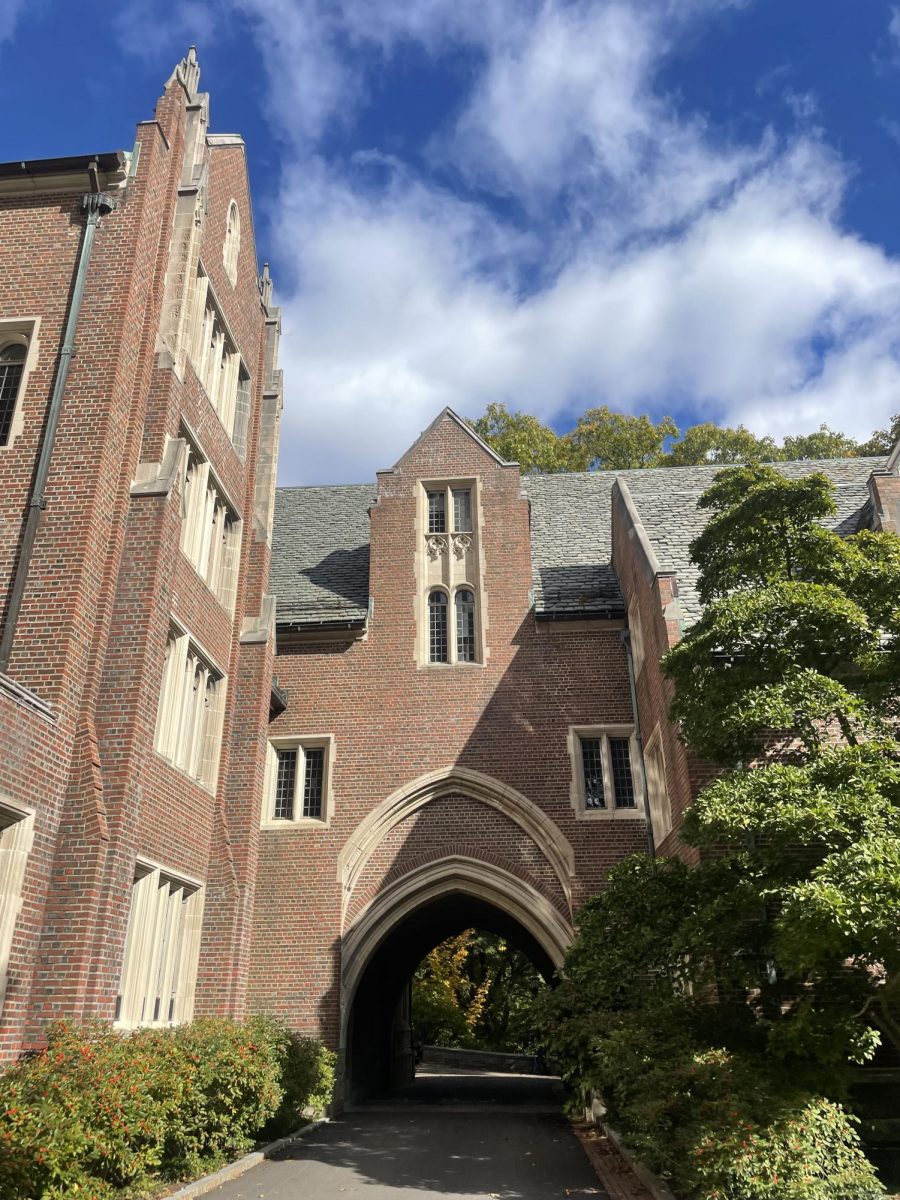Over the course of two weeks, around 1,500 students trickled back onto campus for the in-person fall semester. As COVID-19 cases across the US neared six million, the College implemented extreme precautions to ensure student safety through move-in and beyond.
“I feel move-in went really well. It was definitely different from any other year and there were unexpected challenges that came out, but we were able to surmount everything really well,” said Katherine Conklin ’22, the house president of Bates Hall. “I think all the policies were made with a lot of mindfulness as to what students would actually do. They’re strict in many ways because we want to protect students while recognizing that we’re autonomous human beings and college students that do what we want to do.”
All students were required to quarantine for at least 24 hours after being tested for COVID-19. Students from high-incident states were isolated in a hotel for four days, where they were only permitted to return to campus for move-in after testing negative for COVID-19 thrice.
Conklin emphasized that many of the new policies were dependent on students using common sense and good judgment, such as social distancing and mask-wearing.
“I already know students aren’t [following all the rules]. That’s a hard expectation to have when we already see so many other colleges where we see other students do silly things, but by and large I trust Wellesley students will do what they need to do to keep the community safe,” Conklin said. “I might understand you might forget your mask for the bathroom in the middle of the night, but I trust you guys aren’t going to Boston in the middle of a frat party because that means that we could get sent home for the rest of us.”
HPs and RAs worked closely with administration to ensure that policies would be successfully implemented.
“[Admin] has been incredible about getting student feedback and thinking through the logistics of what can and can’t happen,” Conklin said. “I trust President Johnson with my life. She’s an MD. I feel like everything we’re doing is a step above and beyond in terms of student safety. The testing we’re doing, the mask and physical distancing rules, I feel like we’re in a really good position to create a bubble so long as students continue to act wisely.”
[separator type=”thin”]
Domestic Underclassmen
Having graduated high school amidst a pandemic, the Class of 2024 was no stranger to change.
On June 23, President Paula A. Johnson sent the first of many updates about the move-in process to members of the Class of 2024 and their parents. The announcement laid out the plans for the fall, including the initial decision that only First-years and sophomores would be on-campus. With the campus capacity cut down to almost half its typical number of students due to health risks of the COVID-19 virus, the fall semester would be very different from the norm.
To prepare students for their first semester, orientation was held virtually and addressed a range of subjects, from recommendations for health and safety precautions to introductions to courses and departments at Wellesley. The Wellesley administration also held webinars addressing health concerns and the testing schedule.
Students from high-incidence states, where there was a higher concentration of cases of COVID-19, were required to take an at-home COVID-19 test before coming to campus. They were also housed in a hotel, the Verve, and required to undergo entry testing before moving into their residence halls.
Sasha Santiago ’24, a First-year from Florida, arrived at the hotel on Aug. 17 and spent four days there before moving into campus.
“It made me feel really relieved and safe how put-together and organized Wellesley was, [which was] also another reason why I came to campus because they had protocols set in place,” said Santiago. “Since our president knows a lot about the medical field and the dangers that the coronavirus could bring, she definitely took precautions.”
For students from low-incidence states, the restrictions were less strict. Students were still supposed to self-quarantine for 14 days before coming to campus on the 26th, but were not required to take an at-home test. First-years signed up for move-in and testing appointments in July, and moved in during their respective slots.
Ida Beckett, a First-year from New York, signed up to move in at 3:55 p.m. on the 26th. “I signed up to move in at 3:55 p.m. so I had more time to say goodbye to my mom, and only a few days before did they inform us that if you got in after 3:30, you would get tested the next day”, she said.
Beckett had to stay in quarantine and wait for her test results from the 27th until the next day, missing out on some of the in-person orientation events. Testing results for students moving in from low-incidence states were delayed by a few hours due to the high volume of tests administered, as the College explained in an email sent on the night of the 27th. The delay brought logistical issues along with it.
Lidewij Florusbosch, a First-year student from Michigan, was quarantined for almost 36 hours before she got her results. Students had to order meals beforehand for the 24 hours they would be in quarantine, and there were many who did not order the next meal they needed because they assumed they would be able to leave.
Florusbosch moved into Bates Hall on the 26th. Luckily, she was able to get the food she needed.
“Our House President was doing a really good job of it and sent out emails even the first day I was quarantined, letting people know that if their results weren’t in and that they needed to quarantine longer, that they could just shoot her an email and she’d make sure they got food,” Florusbosch said, “so I never got skipped for any meals.”
[separator type=”thin”]
International Underclassmen
International students were presented with quite the challenge, as they had to navigate through applying for visas, following the necessary health precautions and keeping up with the information the College was sending out leading up to move-in day.
Lana Honcharuk, a First-year student from Ukraine, travelled for more than 20 hours straight to get to Wellesley, after having received her visa only three weeks prior.
“I live in a small town, and the closest big enough airport is in the capital, which is Kiev, and it’s 10 hours away. At first I took a two-hour bus to the closest city, and then I got a train to Kiev, and that was another eight hours, and then went to the airport which was another hour. Then I had a two-hour flight to Istanbul, a two-hour layover, a 10-hour flight to Boston and then a 40-minute drive to Wellesley,” Honcharuk said. “Honestly, I feel like it may be even safer here on campus because we get tested often and people are wearing masks and social distancing. Back in my town … you need to have emergency symptoms just to get tested and there aren’t a lot of tests available.”
However, given how quickly she had to prepare for her journey to Wellesley, she was not able to completely self-quarantine, and even had to obtain her passport from another city. Due to her limited time to prepare, she was not able to keep up with all of the information coming from the administration, and completed her course-registration while traveling.
Despite this, Horncharuk was able to test and smoothly complete the move-in process.
“I still haven’t a hundred percent realized that I’m actually here,” Horncharuk said.
[separator type=”thin”]
Upper class student move-in
Following the unprecedented nation-wide shutdown this past March, hundreds of upperclass students from across the globe prepared to undergo a move-in experience that was unlike any other they had experienced.
Emily Quin ’22, was a part of the first group of students to move into both the hotel and the College campus. After spending almost five days at the Verve Hotel in Natick, Quin reported a positive hotel experience despite her initial hesitation about transitioning from Florida, once the epicenter of the coronavirus.
Because Quin is a house president and also arrived the same day as First-years from high-incidence states, she experienced a quick turnaround time between putting her bags down and providing a warm welcome for the Class of 2024. As a member of res life, Quin notes that the First-year move-in experience was definitely different this year, compared to previous years where the process was normally much more collaborative.
However, she emphasized that this year’s move-in process was not necessarily better or worse — just different.
Aside from the largely streamlined and positive experience, Quin did note some areas that could have been improved. “I wish the meal services for students in quarantine [were] run a little smoother,” she said. “Although we didn’t anticipate the backlog […] we would have preferred that to have been coordinated better.”
As a result of her largely successful move-in experience, Quin has gained confidence in what this academic school year is going to look like, especially after witnessing other students abiding by the guidelines, such as counting the number of individuals in their groups and wearing masks at all times.
Quin is among the several hundred of juniors and seniors at Wellesley that opted to reside on-campus this fall.
As an upper class residential assistant arriving from a low-incidence state, Nora Hoch ’22 shared some of Quin’s sentiments, but had a slightly different experience. While Hoch arrived after those from high-incidence states, she was still one of approximately forty people moving into campus at the time.
“We were the guinea pigs of the experiment,” Hoch said.
As a member of res life, Hoch provided insight on the differences between move-in this year and last year — and how there may have even been some benefits from the COVID-19 move-in process.
“Normally we just have one move-in day, and … there are so many people moving in constantly. It’s really high-energy and chaotic,” Hoch said. “This year because everyone was so spaced out, it was a lot harder to have that energy, but it was nice because we got to greet [the First-years] more personally.”
Like Quin, Hoch expressed renewed optimism after her move-in experience. “Watching the move-in process and all of the steps that were taken by Wellesley made me trust how much thought they were putting into everything,” she said.
Chelsea Chen ’22, a California resident, moved into the Verve Hotel on Aug. 23, transferring to Wellesley on Aug. 27.
Given these unprecedented circumstances, Chen expressed some hesitance in regards to the remainder of the semester. “I feel this constant lingering anxiety because we are all so afraid [due to] the possibility of [it] falling apart,” Chen notes.
Following the mandated hotel quarantine, Chen reflected that she wishes there would have been more transparency from Wellesley; for example, there was confusion in terms of arrival and testing times.
“It [felt] like we are constantly waiting for something to happen, but we don’t really know what we are waiting for,” Chen said.
Additionally, Chen felt that Wellesley’s priority was public health over emotional well-being, noting that this was especially true for upper class students.
“Wellesley is definitely prioritizing catering for First-years right now […] because we want [them] to feel safe and welcomed on campus,” Chen said. “But that does […] leave out the upperclassmen who also need a little bit of help in terms of imagining a restructured social life.”
In face of the difficulties that move-in presented, all three interviewees agreed that it was worth it in order to be back on the College campus.
“Being back on campus is really gratifying — although we cannot be as close to the community as we were before, we still have that assurance that the community is still around you,” Chen said.






